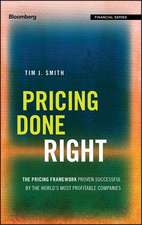The Alignment Performance Link in Purchasing and Supply Management: Performance Implications of Fit between Business Strategy, Purchasing Strategy, and Purchasing Practices: Einkauf, Logistik und Supply Chain Management
Autor Christian Baieren Limba Engleză Paperback – 15 mai 2008
Din seria Einkauf, Logistik und Supply Chain Management
-
 Preț: 368.85 lei
Preț: 368.85 lei - 15%
 Preț: 441.83 lei
Preț: 441.83 lei - 15%
 Preț: 442.98 lei
Preț: 442.98 lei - 15%
 Preț: 442.48 lei
Preț: 442.48 lei - 15%
 Preț: 472.04 lei
Preț: 472.04 lei -
 Preț: 388.90 lei
Preț: 388.90 lei - 15%
 Preț: 438.40 lei
Preț: 438.40 lei -
 Preț: 384.31 lei
Preț: 384.31 lei -
 Preț: 377.73 lei
Preț: 377.73 lei -
 Preț: 392.97 lei
Preț: 392.97 lei - 15%
 Preț: 637.13 lei
Preț: 637.13 lei - 15%
 Preț: 638.43 lei
Preț: 638.43 lei -
 Preț: 384.48 lei
Preț: 384.48 lei - 15%
 Preț: 470.72 lei
Preț: 470.72 lei - 15%
 Preț: 439.89 lei
Preț: 439.89 lei - 15%
 Preț: 440.02 lei
Preț: 440.02 lei - 15%
 Preț: 469.74 lei
Preț: 469.74 lei -
 Preț: 382.18 lei
Preț: 382.18 lei
Preț: 384.31 lei
Nou
Puncte Express: 576
Preț estimativ în valută:
73.54€ • 76.97$ • 61.21£
73.54€ • 76.97$ • 61.21£
Carte tipărită la comandă
Livrare economică 31 martie-14 aprilie
Preluare comenzi: 021 569.72.76
Specificații
ISBN-13: 9783834910578
ISBN-10: 3834910570
Pagini: 246
Ilustrații: XV, 231 p.
Dimensiuni: 148 x 210 x 14 mm
Greutate: 0.33 kg
Ediția:2008
Editura: Gabler Verlag
Colecția Gabler Verlag
Seria Einkauf, Logistik und Supply Chain Management
Locul publicării:Wiesbaden, Germany
ISBN-10: 3834910570
Pagini: 246
Ilustrații: XV, 231 p.
Dimensiuni: 148 x 210 x 14 mm
Greutate: 0.33 kg
Ediția:2008
Editura: Gabler Verlag
Colecția Gabler Verlag
Seria Einkauf, Logistik und Supply Chain Management
Locul publicării:Wiesbaden, Germany
Public țintă
ResearchCuprins
Problem situation and research approach.- A theoretical perspective on the contribution of PSM to the generation of competitive advantage.- A conceptual model of the alignment-performance link in PSM.- An empirical analysis of the alignment-performance link in PSM.- Summary and conclusions.
Notă biografică
Dr. Christian Baier promovierte bei Prof. Dr. Christopher Jahns am Supply Management Institute (SMI) der European Business School (EBS) in Oestrich-Winkel. Er ist als Unternehmensberater für McKinsey&Company, Inc. in Berlin tätig.
Textul de pe ultima copertă
Purchasing and supply management (PSM) has developed into a discipline of major strategic importance for effectively competing in today’s global marketplace. To leverage PSM’s strategic value creation potential, the decisions and activities of the purchasing function must be aligned with the firm’s overall strategic orientation. Despite general agreement on this matter, research and practice lack knowledge on how exactly such an alignment can be achieved and what performance implications it has.
Christian Baier empirically investigates the alignment performance link in PSM. Drawing on the market-based view, resource-based view, principal agent theory, and contingency theory, the author suggests that the relative fit among a firm’s business strategy, its purchasing competitive priorities, and its purchasing practices is key to achieving superior business performance. Results from profile deviation and hierarchical regression analysis of data collected globally from 141 chief purchasing officers in firms with revenues greater than USD 3 billions present strong empirical support for this hypothesis. Baier’s findings provide clear guidance to practitioners on how to design their purchasing strategies and practices to achieve maximum alignment and thus effectively contribute to the firm’s competitive advantage.
Christian Baier empirically investigates the alignment performance link in PSM. Drawing on the market-based view, resource-based view, principal agent theory, and contingency theory, the author suggests that the relative fit among a firm’s business strategy, its purchasing competitive priorities, and its purchasing practices is key to achieving superior business performance. Results from profile deviation and hierarchical regression analysis of data collected globally from 141 chief purchasing officers in firms with revenues greater than USD 3 billions present strong empirical support for this hypothesis. Baier’s findings provide clear guidance to practitioners on how to design their purchasing strategies and practices to achieve maximum alignment and thus effectively contribute to the firm’s competitive advantage.












